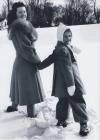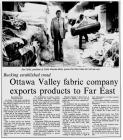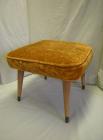27
Edith Dowdall and daughter Fay wearing coats made with Collie Mill fabric. Photo by Malak Karsh1945-1946
Appleton, Town of Mississippi Mills, Ontario, Canada
 Credits:
Credits:North Lanark Regional Museum (2012.79.12.31)
Photographer: Malak Karsh
Donated by Eleanor Wright & Irene Dunn Thompson
28
In the late 1950s and 1960s woollen goods decreased in popularity as consumers turned to polyester and synthetics. Following the demand, the Collie Mill began working with polyesters and synthetics, bringing in the fibres from Montreal and then dying, spinning and weaving them.The mill produced fleece for baby blankets and produced material for house coats, teddy bears, and upholstery.
29
Another product the mill began to produce was pile (fake fur) used for lining winter coats and other goods. In order to make this new product, staff (new and old) had to be trained on the new techniques and machinery. Demand for pile created a busy summer season as staff tried to fill the fall demand of clothing manufacturers preparing for the winter season.Pile also opened up a whole new market for the company. In the late 1970s Collie Woollen Mills began exporting to the Far East. The low Canadian dollar and the low labour content involved in making pile made exporting to countries like South Korea economical. This new venture helped increase sales and jobs at the mill. In 1979 the company went from 190 employees to 225 and went from $9 million in sales in 1978 to predicting sales of $18 million in 1980.
30
Ottawa Valley Fabric Company exports products to Far East14 November 1979
Appleton, Town of Mississippi Mills, Ontario, Canada
 Credits:
Credits:Google News Archive, Ottawa Citizen, November 14, 1979
31
Santa Tuque and Teddy Bear made using Pile produced at the Collie Woollen MillsCirca 1980s
Appleton, Town of Mississippi Mills, Ontario, Canada
 Credits:
Credits:Courtesy of Irene (Dunn) Thompson
32
Stool made with upholstery fabric manufactured at the Collie Woollen MillsCirca 1980s
Appleton, Town of Mississippi Mills, Ontario, Canada
 Credits:
Credits:Courtesy of Irene (Dunn) Thompson
33
In addition to selling to large manufacturers, the Collie Woollen Mills also sold directly to the consumer. The article "Appleton: A storybook town" by Colleen Anderson Kong (Ottawa Journal T.V. Guide, May 31, 1980 ) discusses a factory-outlet store run by Collie Woollen Mills."[...] the present-day Collie Woolen Mills Ltd., [is] known by bargain-conscience consumers all over the Valley and Ottawa for its factory-outlet store where fleece fabrics, velours, knits and upholstery fabrics sell for about $1.20 to $2.50 a yard, with specials such as the 55 cents a pound pieces."
34
In about 1948 William Collie decided to retire and left his sons to manage the mill. His son James E. Collie took over management of the business and later William's grandson James S. Collie joined the business along with Ralph Brown, son-in-law of James E. Collie.The 1980s were tough financial years for the Collie Woolen Mills. Supplies such as poly-cottons and acrylic yarns were hard to get and the economy was moving towards overseas labour and production. In 1987 the company went into receivership and the Ontario Development Corporation became the legal owner in April 1987.
In August 1987, under new owners, the mill reopened as a numbered company, 724597 Ontario Limited, and operated under the name 'Appletex'. The mill continued to struggle financially. New investors came forward in 1989 injecting capital into the business however, in March 1992 all operations ceased and the premises were abandoned.
35
This storyline was produced by the North Lanark Historical Society and the North Lanark Regional Museum in Appleton, Ontario (Town of Mississippi Mills). The majority of the research for this project was conducted at the North Lanark Regional Museum using the collection, archives, library and 2012 oral history interviews. The oral history interviews were part of the 2012 "Digitally Preserving the Past for the Future" project, funded by the Museums and Technology Fund through the support of the Government of Ontario, Ministry of Tourism, Culture and Sport. These oral interviews are a great source of local history. Summaries of the interviews are available on our website and the full interviews can be viewed on-site at the museum.To learn more about the Collie Woollen Mills in Appleton please contact the staff or volunteers at the museum:
WEBSITE: www.northlanarkregionalmuseum.com
PHONE: 613-257-8503
EMAIL: appletonmuseum@hotmail